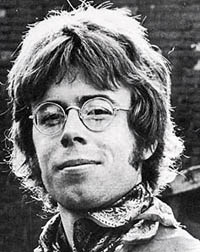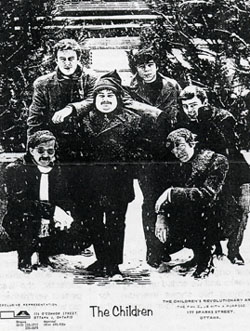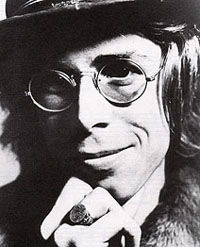 14 March 2001 - In late 1967, two years before Bruce Cockburn had begun recording his first self-titled album, four of his poems were published in the 10th issue of a small Kitchener, Ontario-based magazine called Weed, edited by Nelson Ball.
14 March 2001 - In late 1967, two years before Bruce Cockburn had begun recording his first self-titled album, four of his poems were published in the 10th issue of a small Kitchener, Ontario-based magazine called Weed, edited by Nelson Ball.  14 March 2001 - In late 1967, two years before Bruce Cockburn had begun recording his first self-titled album, four of his poems were published in the 10th issue of a small Kitchener, Ontario-based magazine called Weed, edited by Nelson Ball.
14 March 2001 - In late 1967, two years before Bruce Cockburn had begun recording his first self-titled album, four of his poems were published in the 10th issue of a small Kitchener, Ontario-based magazine called Weed, edited by Nelson Ball.
The four poems -- The Black Pope's Brittle Sermon, For "The Madison Ave. Boys Of The Aegean", Ruthie's Tired Thing, and The Pauper's Answer -- offer a rare insight into Cockburn's early use of language. This feature from The Cockburn Project includes the four poems in full, together with the few original notes that accompanied them.
According to a March 3rd, 2001 article -- more than three decades later -- Cockburn again seems to be thinking of publishing poetry:
"...maybe I'm supposed to be writing poetry now. It's occurred to me that maybe what I should be writing is an instrumental album and a poetry book."
-- from "The Witness," by Bill Cameron, Saturday Night website, March 3, 2001.
Whether this happens or not remains to be seen, but poetry has certainly been an influence on Cockburn's song lyrics from the beginning. The ideas of such poets as Robert Graves and Kenji Miyazawa (to name just a few) have fed his songs:
"The light went on with poetry for me in grade six when we had to memorize a poem and I remember looking through the book- whatever the textbook was- and there was a poem by Archibald MacLeish called "Ars Poetica". That's the one I picked to memorize and it blew me away. This big light went on because it was totally abstract, almost, I don't know what the literary term would be, almost a cubist poem."
-- from "The Cockburn Transcripts," by Bill Cameron, Saturday Night website, March 3, 2001.
"I always loved the poetic use of words. When I first heard Bob Dylan and John Lennon, it was revealed to me that you could put poetic words with music."
-- from "Bruce Cockburn- A Burning Light And All The Rest," by William Ruhlmann, Goldmine, April 3, 1992.

A further influential figure in Bruce's writing life was poet Bill Hawkins, whom Bruce was associated with during his tenure with Ottawa band The Children (pictured left in a publicity shot). He encouraged Cockburn to write words to go with the music he was already composing.
In the summer of 1967, when the following poems were published, a lot of change was happening in society and culture throughout the world. The Vietnam War was kicking into high gear, the "Summer Of Love" was happening in San Fransisco, and young people across North America were finding new means of expression. It was also a time of change in the then-22-year-old Cockburn's life.
"The second half of the '60's really was a kind of learning period, in terms of writing, for me", he commented (quoted in "Cockburn's Convictions Bring Him to Verde Fest as Well," by Salvatore Caputo, The Arizona Republic, October 6, 1995).
Cockburn had already spent some time busking around Paris as a street performer and attended the Berklee College of Music in Boston. Returning to Ottawa in 1966, he began playing in a variety of bands, gaining experience and looking for direction. He joined The Children, and made some demo recordings with them before they broke up at the beginning of 1967.
Bruce played with The Esquires for a short period before moving to Toronto the same year to play with a band called The Flying Circus (later re-named Olivus). A psychedelic rock band that opened for Wilson Pickett and Jimi Hendrix, Bruce was composing all their material, writing songs with titles like St. Martha's Earthworm. Dennis Pendrith was also a member of Flying Circus and would play bass on many of Bruce's solo albums in the years to come. They both would later appear in one of the many incarnations of Three's A Crowd in 1968-1969.

At this time, Cockburn was experimenting, both with various spiritual approaches to life, and with drugs. A July 1972 article from Saturday Night magazine by Myrna Kostash describes Bruce's lifestyle in the late 1960's thus, "He was mostly stoned and living at night, not eating or sleeping for long periods, then eating chocolate bars and sleeping on people's floors." Whether this view was truly representative or not, we can only guess.
In August of 1967, the Yorkville section of Toronto -- an area Bruce frequented often -- was a melange of coffee shops, low rent apartments, and funky hippie stores, and it had become the musical center of the city. The influx of a young counter-culture to the area had made the city administrators and politicians nervous and it wasn't long before things came to a head.
The hippies wanted the city to close Yorkville Avenue (the main thoroughfare) to traffic and make it a pedestrian mall. A petition was circulated and most of the businesses on the street were in favor of the idea. Yet, the city refused and wanted to "clean up" the area and turn it into an upscale shopping district. A party at a warehouse was broken up by the cops, and the hippies headed back to Yorkville and sat down in the street, preventing any cars from entering.
Bruce Cockburn was at the warehouse party, but commented, "I remember hearing about the sit-in, but I really wasn't involved in things like that then, so I didn't make the connection." (quoted in "After The Goldrush," by Nicholas Jennings, 1997.)
More importantly, this era was a time of discovery and artistic exploration for Cockburn. He was playing in bands of many different musical styles, and writing some poetry, all of which was leading him to become a solo performer:
"By '67 I had a little body of work that I'd written, some of which was specific to the various bands, but some of which transcended the limitations of those bands and stood on their own and I discovered that I liked all those songs better when I just played them by myself".
-- from "Bruce Cockburn- A Burning Light And All The Rest," by William Ruhlmann, Goldmine, April 3, 1992.
The following four poems are a fascinating glimpse of Bruce's early writing and provide us with a look at some of the first stepping stones that have lead him to where he is today.
Rob Caldwell
*Project Editor's Note: The first poem, The Black Pope's Brittle Sermon, begins with the line "When the only reality is lions in the street / it's time to move." Visitors to the Project who have read the song comments for Wondering Where The Lions Are will be aware that Cockburn has often said about the song, written on 12 January 1979, that it was written following a second dream about lions. The following three quotes from Cockburn tell the story:
"I have a relative who is involved in one of those kinds of government jobs where they can't say what they do. The part you can say involves monitoring other people's radio transmissions and breaking codes. At that time China and the Soviet Union were almost at war on their mutual border. And both of them had nuclear capabilities. I had dinner with this relative of mine and he said, "We could wake up tomorrow to a nuclear war." Coming from him, it was a serious statement." (1994) So when was the first dream? This first poem appears to refer to it, which helps date the first dream as 1967 or earlier. This echo gives a sense of how long these ideas gestate for. |
In the distant ringing you shake your hair,
yet must blood flow,
flow with a hiss through all the tight places,
in each cell a sigh.
We are not brittle except in bones,
and inside them the wind blows in earnest
with a wrinkled forehead.
A bit of silver spittle on the ground,
A shining rock inside the skull,
an echo, dry, of whistle at every corner.
Flowers slow and heavy as the ice grows
to sharpened claws
and final as the last climb.
Death and the flower of Osiris.
Death and the phallus of death.
But though I have no
particular sense of time
the clock still ticks
To dress in chains is a sign of weakness
But not knowing my strength ends of string still fray
A labour pain for every letter,
are words still to be spelled?
Half in and half out,
can you see either end?
The between of one and two
is it really rain and brown pine needles?
Contrive is a word of Latin root....
| ** Project Editor's Note: This literary reference was an original note included by Cockburn, [click for more information about the book] |
| Here | The dark on which I feed |
| You | The red room where I cannot reach your blood |
In the ring,
in the cuckoo,
in the tick at the wall
slow
vision buzzes in time| *** Project Editor's Note: This was an original note by the Weed editor. |
Final Project Editor's Notes: The poems above were not numbered in the original. Late 1960s photos of Cockburn used in this article were taken from the All The Diamonds songbook. One more copy of the 1967 edition of Weed is still available from bobryan99@hotmail.com.